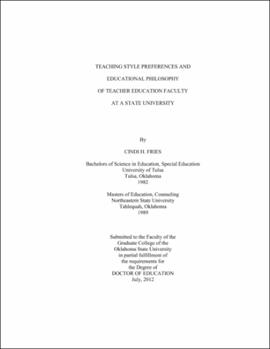| dc.contributor.advisor | McCharen, B. | |
| dc.contributor.author | Fries, Cindi H. | |
| dc.date.accessioned | 2013-11-26T08:33:20Z | |
| dc.date.available | 2013-11-26T08:33:20Z | |
| dc.date.issued | 2012-07 | |
| dc.identifier.uri | https://hdl.handle.net/11244/7216 | |
| dc.description.abstract | Scope and Method of Study: | |
| dc.description.abstract | An educational philosophy and teaching style provide a foundation for understanding and for guiding guide decisions about curriculum, teacher-learner relationship and professional practice. The purpose of this descriptive quantitative study was to describe the educational philosophies and teaching styles of the teacher educators at a specific Midwestern state university in the United States and to compare this to the preferred educational philosophy and teaching style of the university's College of Education (COE). All teacher educators (N=122) at this university were invited via the university's e-mail system to participate in this on-line survey. A total of 45 participants responded. The variables of education philosophy were measured using the Philosophy of Adult Education Inventory (PAEI). Teaching styles, as measured using the Principles of Adult Learning Scale (PALS), were categorized as either learner-centered or teacher-centered. The educational philosophies used in this study were liberal, behavioral, humanism, progressive and radical. The educational philosophies and teaching styles were examined in relationship to the demographic variables of: gender age, academic rank, assigned college at the university, years working in higher education, years teaching at the university, Pk-12 teaching experience and Pk-12 administration experience. The concepts of pedagogy and andragogy were contrasted between adult educators, and higher education and Pk-12 educators. | |
| dc.description.abstract | Findings and Conclusions: | |
| dc.description.abstract | It was found that the majority of teacher education faculty held the progressive educational philosophy and their preference for teacher-centered teaching style did not match. This may indicate that they believe in, but are not utilizing, the concepts of learner-centered teaching styles. The COE and faculty were in congruence with the same philosophy, however they differed in the faculty preferred teaching style. With the exception of gender and Pk-12th grade teaching, demographic variables had no statistical significance. | |
| dc.format | application/pdf | |
| dc.language | en_US | |
| dc.rights | Copyright is held by the author who has granted the Oklahoma State University Library the non-exclusive right to share this material in its institutional repository. Contact Digital Library Services at lib-dls@okstate.edu or 405-744-9161 for the permission policy on the use, reproduction or distribution of this material. | |
| dc.title | Teaching style preferences and educational philosophy of teacher education faculty at a state university | |
| dc.contributor.committeeMember | Ausburn, L. | |
| dc.contributor.committeeMember | Mendez, J. | |
| dc.contributor.committeeMember | Harris, E. | |
| osu.filename | Fries_okstate_0664D_12226.pdf | |
| osu.accesstype | Open Access | |
| dc.type.genre | Dissertation | |
| dc.type.material | Text | |
| dc.subject.keywords | educational philosophy | |
| dc.subject.keywords | teaching style | |
| dc.subject.keywords | learner-centered | |
| dc.subject.keywords | teacher-centered | |
| dc.subject.keywords | pedagogy | |
| dc.subject.keywords | andragogy | |
| thesis.degree.discipline | Applied Educational Studies | |
| thesis.degree.grantor | Oklahoma State University | |
